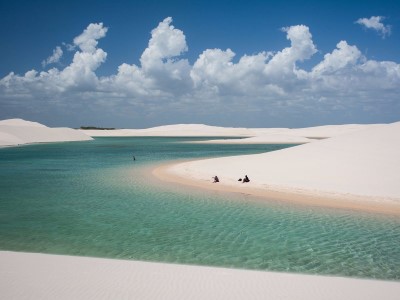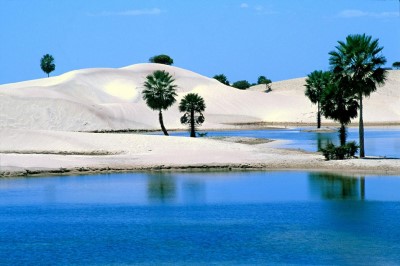The Lençóis Maranhenses: New Brazilian Jewel Inscribed on UNESCO’s World Heritage List
The Lençóis Maranhenses National Park in Brazil’s Maranhão state has recently been included on UNESCO’s World Heritage List. This exceptional natural site, famous for its white sand dunes dotted with freshwater lagoons, has now been recognised for its outstanding universal value.
A unique landscape
 The Lençóis Maranhenses, often compared to a “flooded desert”, covers an area of 155,000 hectares. This national park is unique in its kind, with shifting dunes forming undulating patterns and crystalline lagoons that appear and disappear according to the rainy and dry seasons. The formation of these lagoons is due to the accumulation of rainwater that remains trapped between the dunes, creating a breathtaking natural spectacle.
The Lençóis Maranhenses, often compared to a “flooded desert”, covers an area of 155,000 hectares. This national park is unique in its kind, with shifting dunes forming undulating patterns and crystalline lagoons that appear and disappear according to the rainy and dry seasons. The formation of these lagoons is due to the accumulation of rainwater that remains trapped between the dunes, creating a breathtaking natural spectacle.
The site is also home to a rich biodiversity, with flora and fauna adapted to the extreme conditions of the environment. Notable species include marine turtles, fish that survive in the temporary lagoons and a variety of migratory birds.
Our article: The Nordeste via the Route of Emotions
Well-deserved recognition
UNESCO’s recognition of the Lençóis Maranhenses underlines the importance of preserving this fragile ecosystem. According to the UNESCO committee, the national park deserves its World Heritage status for a number of reasons:
- Natural beauty: The landscape of dunes and lagoons offers a visual spectacle that is unique in the world.
- Biodiversity: The park is a crucial habitat for many species of flora and fauna.
- Ecological Importance: The natural processes that form the lagoons and move the dunes are of great scientific value.
Tourist attraction
 UNESCO World Heritage status will undoubtedly boost the tourist appeal of the Lençóis Maranhenses. Already popular with travellers seeking spectacular scenery and outdoor adventure, the site is set to see an increase in the number of international visitors. This international recognition is also an opportunity to strengthen conservation efforts and raise public awareness of the importance of protecting this unique environment.
UNESCO World Heritage status will undoubtedly boost the tourist appeal of the Lençóis Maranhenses. Already popular with travellers seeking spectacular scenery and outdoor adventure, the site is set to see an increase in the number of international visitors. This international recognition is also an opportunity to strengthen conservation efforts and raise public awareness of the importance of protecting this unique environment.
Challenges and prospects
 However, the influx of tourists also poses challenges in terms of management and conservation. It will be crucial to put measures in place to ensure that tourism is sustainable and that the impact on the ecosystem is minimised. The Brazilian government, in collaboration with local and international organisations, will need to work to maintain the balance between nature protection and economic development.
However, the influx of tourists also poses challenges in terms of management and conservation. It will be crucial to put measures in place to ensure that tourism is sustainable and that the impact on the ecosystem is minimised. The Brazilian government, in collaboration with local and international organisations, will need to work to maintain the balance between nature protection and economic development.
The inclusion of the Lençóis Maranhenses in the UNESCO World Heritage List is a well-deserved recognition of the beauty and ecological importance of this unique natural site. This distinction provides a valuable opportunity to promote sustainable tourism and strengthen conservation efforts, ensuring that this natural jewel can be enjoyed by future generations.
Photos: MTUR
RECENT POSTS

122nd UN Tourism Executive Council: Innovation, Investment and Education at the Heart of Discussions
LATAM NEWS 122nd UN Tourism Executive Council: Innovation, Investment and Education at the Heart of Discussions The 122nd edition of the UN Tourism Executive Council was held in Cartagena de Indias, Colombia, with the aim of ensuring a more inclusive, resilient and...

“From the Great Wall to Machu Picchu”: A Documentary to Strengthen Tourism Links between China and Peru
LATAM NEWS “From the Great Wall to Machu Picchu": A Documentary to Strengthen Tourism Links between China and Peru To strengthen cultural exchanges and attract Chinese travellers to Peru, PROMPERÚ has collaborated on an ambitious audiovisual project: the documentary...

Best Tourism Villages 2024: an award for excellence in rural tourism
LATAM NEWS Best Tourism Villages 2024: an award for excellence in rural tourismEvery year, UN Tourism celebrates rural destinations that embody sustainable and inclusive tourism through its Best Tourism Villages initiative. The 2024 edition once again highlighted...


